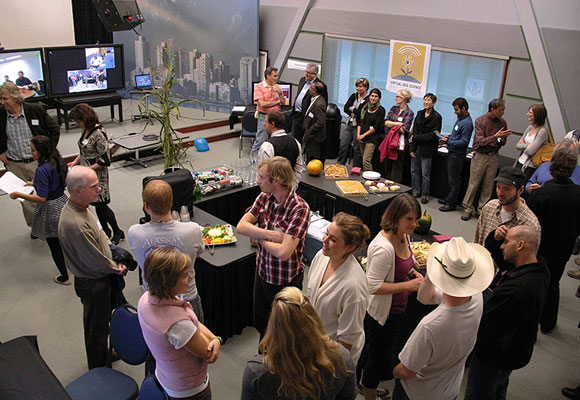 On Friday October 29, 2010, the Centre for Teaching, Learning and Technology (CTLT) and the Faculty of Land and Food Systems presented the Canadian Soil Web Collaborative, as part of UBC’s 3rd annual Celebrate Learning Week. Celebrate Learning Week is an annual week-long initiative that seeks to honour and celebrate teaching and learning across UBC Vancouver, and to highlight and promote student learning and development opportunities.
On Friday October 29, 2010, the Centre for Teaching, Learning and Technology (CTLT) and the Faculty of Land and Food Systems presented the Canadian Soil Web Collaborative, as part of UBC’s 3rd annual Celebrate Learning Week. Celebrate Learning Week is an annual week-long initiative that seeks to honour and celebrate teaching and learning across UBC Vancouver, and to highlight and promote student learning and development opportunities.
Maja Krzic, Associate Professor in the Faculty of Land and Food Systems and Faculty of Forestry, and Chris Crowley, Instructional Designer / Project Manager at CTLT commenced the event with an energetic introduction. They announced the rewarding results of years of collaboration between the Faculty of Land and Food Systems, CTLT, Thompson Rivers University, the University of Northern British Columbia, Agriculture and Agri-Food Canada, the University of Saskatchewan, the University of Toronto-Mississauga, and Nova Scotia Agricultural College. Maja and Chris noted that this group of collaborators “developed online soil science learning resources that can be used by a community of learners and professionals despite geographic limitations.”
Maja explicated the importance of this project: “Saying ‘Imagine’ after five times gets kind of boring… with online technology we can show students actual soil.” She further explained that textbooks are not always enough to get a full understanding of soil science principles: through these various online teaching resources, students can view animations, simulations and videos. Such innovative resources can capture things that are not readily observable: how soil changes over time, the spatial scale, and the exotic soil types from around the world.
Michelle Lamberson, Managing Director of CTLT, celebrated in the fact that Maja “not only has a lot of good ideas, but she is able to put them into action.” Paul Stacey, Director, Communications, Stakeholder and Academic Relations at BCcampus, showcased how a project can benefit from funding from BCcampus such as this one. Consequently, he extended the call for proposals, especially “ones in science.” In addition to receiving support from BCcampus, Maja thanked the UBC Teaching and Learning Enhancement Fund for their generous funding.
 The celebration then moved to a “broader perspective”—participants from different parts of Canada were invited to speak via teleconference. Professor Nathan Basiliko from the University of Toronto (Mississauga) commented on the usefulness of these open access educational resources for a young faculty member in early stages of his teaching career. He highlighted that he was delighted to become a part of the project funded by NSERC’s PromoScience Fund on enhancing soil science education in Canadian high schools, which is truly a “trans-Canada collaborative.” Rachel Strivelli, a former graduate student of Maja currently working in Toronto, expressed her joy of working on several of these collaborative projects to inspire high school teachers to adopt the soil science online learning tools which she is sure will “excite and establish an intricate connection” with students.
The celebration then moved to a “broader perspective”—participants from different parts of Canada were invited to speak via teleconference. Professor Nathan Basiliko from the University of Toronto (Mississauga) commented on the usefulness of these open access educational resources for a young faculty member in early stages of his teaching career. He highlighted that he was delighted to become a part of the project funded by NSERC’s PromoScience Fund on enhancing soil science education in Canadian high schools, which is truly a “trans-Canada collaborative.” Rachel Strivelli, a former graduate student of Maja currently working in Toronto, expressed her joy of working on several of these collaborative projects to inspire high school teachers to adopt the soil science online learning tools which she is sure will “excite and establish an intricate connection” with students.
Professor Paul Sandborn from the University of Northern British Columbia noted that back in the 1980s, UBC was the only place in the province to offer courses in the field of soil science. Now, soil science education is “scattered across the province.” Thanks to online courses and technology, the soil science community in BC is able to continue to offer a cohesive program. Associate Dean Daniel Pennock from the University of Saskatchewan praised the Canadian Soil Web Collaborative as the “most innovative work of its kind in Canada… especially with its national level of programming.”
The celebration peaked with a champagne toast, the display of a blooper reel from years of work on the Soil Web Collaborative, and the serving of refreshments. Guests were invited to network and to explore four different learning tools stations and their respective websites: Soil Parent Material and Landscapes, Land Use Impacts (LUI) Tool, the Soil Monolith Collection at UBC, and Virtual Soil Processes. Other links that may be of interest include: Soil Orders of UBC, Virtual Soil Lab Modules, and Soil Web 200. For more information regarding the soil science online learning tools, please contact Maja Krzic at maja.krzic@ubc.ca.
If you are interested in taking a soil science course online, UBC offers the distance education course APBI 200 – Introduction to Soil Science. Stay tuned for Spring 2011, when a new exciting distance education course “APBI 100: Soils and the Environment” will be offered. This new course is primarily targeted for those students in the Faculty of Arts.

